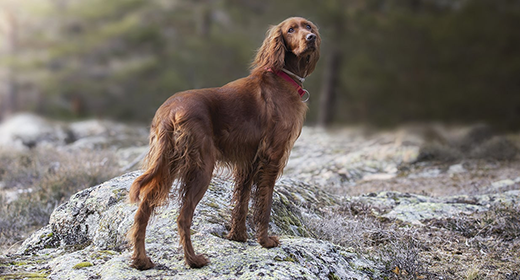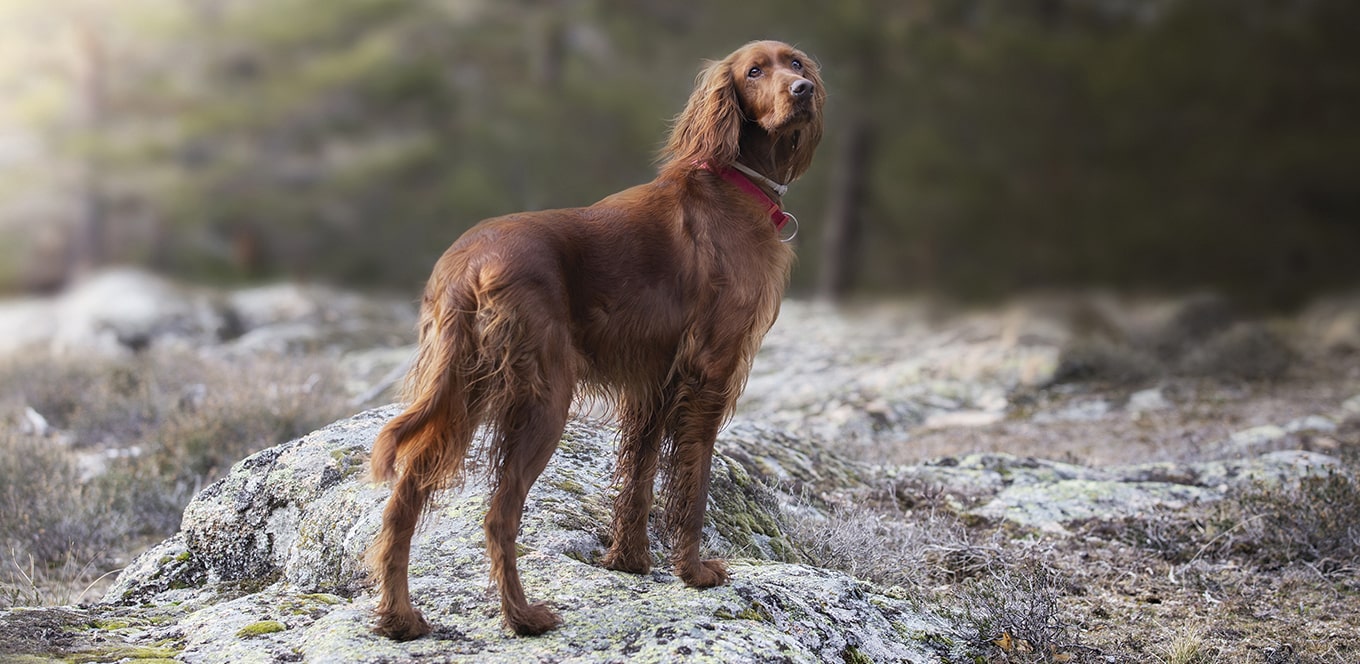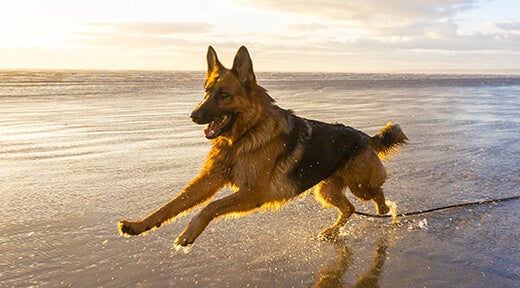

Many factors influence the overall health of your dog’s skin and coat: His diet and grooming schedule, the presence of parasites and seasonal changes can all play a role. Whether your dog is prone to skin issues or you want to ensure your pup’s health for years to come, you’ll need to keep a few key things in mind.
Regular veterinary checkups will ensure that your dog is disease- and parasite-free. Flea-bite allergy and external parasites, such as mange, are primary causes of hair loss and skin problems.
In addition to scheduling checkups, check your dog’s hair and skin at least once a week for signs of fleas (flea dirt or bites), mange or other skin conditions, and hair loss.
If your dog’s skin seems thick or scaly or lacks elasticity, or if you notice hair loss, these signs might indicate a nutritional deficiency. Check with your veterinarian, and try feeding him a premium food. It will usually take between six and eight weeks after a diet change to see results. If your pet continues to scratch and chew his skin, consult a veterinarian.
When looking for a dog food that will promote good skin and coat health, keep the following in mind:
What's the best thing you can do for your dog’s skin and coat health? Feed a high-quality food packed with protein, such as IAMS™ ProActive Health™ Adult MiniChunks. Dogs are best fed as carnivores: They need protein and thrive on diets rich in animal-based protein sources. Additionally, their hair is actually 95% protein! Although coat growth varies by breed, the combined growth of all the hair can add up to 100 feet per day in some dogs. This means that nearly 30% of the animal’s daily protein requirement is used just for coat growth during some seasons.
Premium pet foods are carefully formulated to be complete and balanced, which means the food includes all of the nutrients your pet needs. Ingredients in premium foods are highly digestible so your dog's body uses the nutrients efficiently. Less costly foods might contain lower-quality proteins. Though a bag of premium food may cost a bit more than other brands, you might be able to feed less, which minimizes the cost difference.
It’s easy to spot a healthy-looking dog: He has a gleam in his eye, a bounce in his step and a glossy, healthy coat. That glow is a reflection of your dog’s overall health and a good gauge of what’s going on inside and outside.
Regular grooming helps take care of the “outside” by removing loose hair, dirt and mats, and distributing skin oils. Grooming lets you check your pet closely, catching any skin problems early. Plus, your dog will love the attention!
As dogs age, their skin might become more sensitive. Select a mild dog shampoo for your older dog. Shampoos made from coconut or palm oils are the mildest. Unusual or “doggy” odors can signal disease, so if odors persist, contact your veterinarian. Do not use human shampoos because they are often too harsh for a dog’s skin.
When bathing your dog, be sure to rinse him thoroughly. Residue left on the skin can be irritating. You might want to follow the shampoo with a hair conditioner to control static electricity and add extra body or sheen.
During the summer, pay close attention to your dog’s skin and coat. Many dogs shed a winter coat and others face flea problems, so it’s a good time to evaluate your dog’s skin and coat condition to nip any problems in the bud.
Attention to your dog's coat and skin from the inside out will produce a healthy, lively dog that is a joy to look at — and a pleasure to live with — every day!




German Shepherd Dogs are one of the most loved breeds in the world! They're incredibly smart, versatile and learn new behaviors quickly. If that wasn't enough, they're also faithful companions that are very protective of their families.
But before you take the leap and adopt a German Shepherd, there are a few things you must know about looking after one. As is the case with raising a dog of any breed, caring for a German Shepherd needs commitment, patience and understanding.
a. Exercising German Shepherds
German Shepherds are fantastic creatures in every sense, and it is easy to see why. GSDs are naturally energetic and need dedicated time daily to burn it off. They need at least 60minutes of daily physical exercise such as running and playing fetch in a park. A fit dog is a happy dog and one that is exercised regularly will not be happy, but healthy too.
b. Grooming German Shepherds
Be prepared to keep your vacuum cleaner handy. GSDs have thick coats, making them prone to shedding. Grooming your GSD takes time as well. You will need to give your pet a comb down at least 3 times a week. But you won’t need to bathe your dog too often (unless advised to do so by your vet).
c. Dog Food for German Shepherds
To stay healthy and active, German Shepherds require complete and balanced meals that are tailor-made to meet their unique needs. You could try a premium recipe like IAMS™ Proactive Health™ for Adult German Shepherds, which is specially formulated food for German Shepherds. This recipe is a blend of beet pulp and prebiotics (FOS) that supports healthy digestion, calcium, magnesium and other minerals and vitamins to support a healthy heart, and Omega 6 and 3 fatty acids to support skin and coat health. We recommend dividing their daily intake into two meals.
|
SIZE OF GERMAN SHEPHERD |
RECOMMENDED DAILY FEEDING (g) |
| 20-30 kg | 245-330 |
| 30-40 kg | 330-410 |
| 40-50 kg | 410-485 |
| 50-60 kg | 485-555 |
d. Diseases German Shepherds are Susceptible to
Like most dog breeds, German Shepherds are prone to diseases as well. But here are a few common diseases they are known to suffer from. Hip and elbow dysplasia, allergies, degenerative myelopathy, inherited eye diseases, exocrine pancreatic insufficiency, skin and heart disease, and thyroid disease. If you remain dedicated to providing your dog with the right kind of nutrition along with proper exercise, you should be able to keep illness at bay.
German Shepherds are a special breed. They have high energy, are strong and have oodles of stamina. But they also need a lot of attention and activity. If you are away from home frequently or dont have the time to spend exercising or grooming them, then a German Shepherd isn't the right choice for you. So are you ready to start caring for a German Shepherd? Ask yourself these questions before making a decision:
Do I have the time and energy to train my German Shepherd?
Do I have enough space in my home for such a large dog to flourish?
Am I financially stable to care for my GSD if any health issues arise?
If you answer yes to these questions, then you are ready to enjoy an action-packed life with
your furry new friend!
